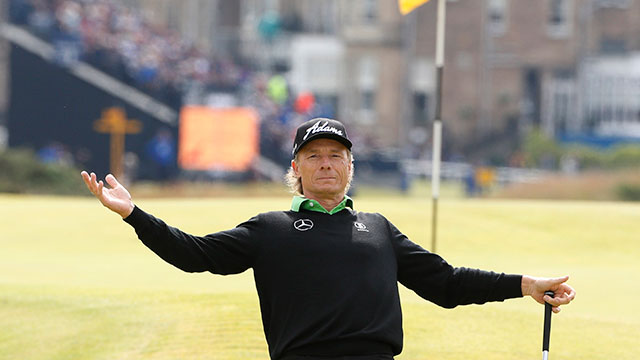NEWS
Champions Tour's Langer sees no reason to slow down

TUCSON, Ariz. -- By any measure, Bernhard Langer is the most dominant golfer on the Champions Tour at the moment.
Langer, 58, leads the tour in earnings ($333,850) through three events. He finished in the top 10 in all three and won last month's Chubb Classic. It was the 10th year in a row in which he has won at least one PGA Tour Champions event. His 26 career victories rank third all-time. He also has won the past two Charles Schwab Cups.
Those accomplishments make Langer the favorite in a stacked field at the Tucson Conquistadores Classic.
The Star chatted with Langer about his game, his career, the controversial "anchoring" ban and, of course, Tiger Woods. Here are some highlights from that conversation with the two-time Masters champion and proud father of four:
What has been the biggest factor in your continuing success?
A: "Consistency, I suppose. There's guys that are consistent, but they're not winning. I've been very blessed to stay reasonably healthy. I feel my golf game is still improving a little bit here and there. My technique the last eight or 10 years has gotten slightly better. What I'm losing in distance, strength and flexibility, I'm hopefully making up with more precision, better shots, a better understanding of my own game."
You suffered a potentially debilitating back injury while serving in the German military at age 19. Do you feel fortunate that you were able to have a career after that?
A: "Very much so. At the time I thought I was done before I'd really taken off. They told me I had a stress fracture and two bulging discs. I was hospitalized for 4 1/2 weeks, laying on the bed. My legs were pulled up to relieve some of the stress or whatever they were trying to do. I thought I might never play golf at any level. But I haven't had an operation yet. They wanted to operate on me, but I wouldn't let them. And so far I've survived without it. It's pretty amazing to win 99 tournaments with that kind of backdrop."
It's incredible. You've won with a variety of putting techniques. You seemed frustrated and befuddled at the time the ban on anchoring was announced. Do you still feel that way, or have you accepted it and moved on?
A: "I've accepted it. But it doesn't make any sense. To me it never made any sense, and to a lot of people it doesn't. ... My argument was always, if it's easier to putt that way, everybody would putt that way, wouldn't you think? Out of 100 touring pros, you would see 99 putting that way. And that's not the case. I don't think we ever had more than 10-15 percent of the players, no matter at what level, putt with an anchored putter. That just shows that it's not easier. It's not better. It only works for some. And if you compare that to the driver that we're using nowadays, the big driver, how many are using a big driver?"
Everybody, right?
A: "Exactly. And why? Because it's advantageous. There's no doubt about it. The same thing with hybrids. Who's using hybrids? Ninety-nine out of 100, guaranteed. Because it's just easier to hit a hybrid than a 1-iron or 2-iron. Those are advantageous clubs.
"The other thing (is), it's going to take a lot of joy and fun away from amateurs, whether they have the yips or the shakes or they have a bad back and they'd rather stand more upright because it hurts them to bend over with a shorter putter. We're trying to grow the game. Then they're making a decision like that, which is hurting it. It's hurting thousands of golfers around the world."
Let's move on. You won the first of two Masters, in 1985, at age 27. When you're that young, do you realize what you've accomplished? Or does it take a while for it to truly soak in?
A: "It takes a few days to sink in. The next week you're being introduced as the Masters champion on the first tee, not just Bern-hard Langer from Germany. Your life changes a little bit. Your income goes up. I got some appearance fees when I played around the world. All that was a nice side benefit. It didn't change me as a person, but it certainly made life a little easier. You're in an elite group of people that can join the Champions Dinner every year and get to be invited back to the Masters as long as you live. That's pretty cool."
How much longer do you plan to play or want to keep playing?
A: "I've always said for many years now that three things need to be present. I need to be healthy enough to do what I'm doing, I need to enjoy the game and I need to have some success. So if those three things are there, I'll probably continue unless something happens in our family or with my health or if I lose interest in the game. If nothing dramatic happens, I'm probably going to play for a number of years. I'm 58. I see guys like Hale Irwin and Tom Watson and a few others that are still competitive into their 60s."
This article was written by Michael Lev from The Arizona Daily Star, Tucson and was legally licensed through the NewsCred publisher network.
